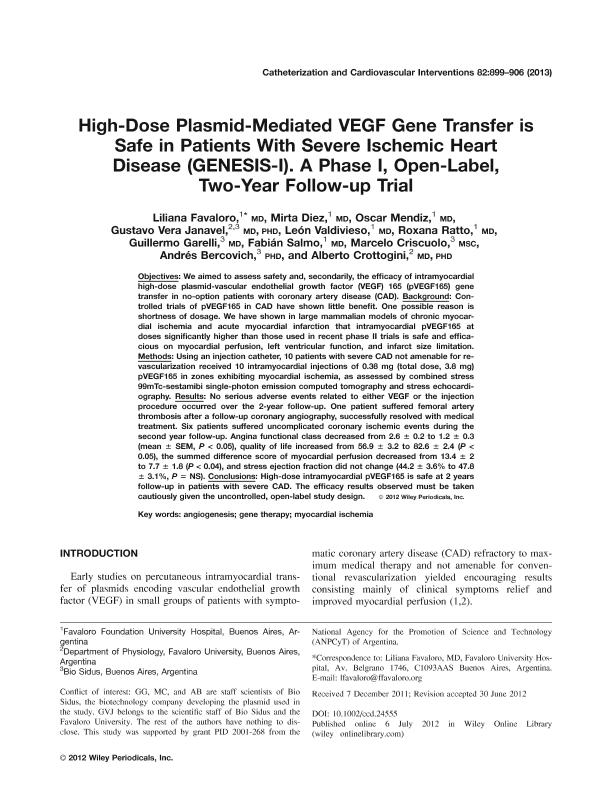Artículo
High-Dose Plasmid-Mediated VEGF Gene Transfer is Safe in Patients With Severe Ischemic Heart Disease (GENESIS-I): A Phase I, Open-Label, Two-Year Follow-up Trial
Favaloro, Liliana; Diez, Mirta; Mendiz, Oscar; Vera Janavel, Gustavo; Valdivieso, León; Ratto, Roxana; Garelli, Guillermo; Salmo, Fabián; Criscuolo, Marcelo; Bercovich, Andrés; Crottogini, Alberto Jose

Fecha de publicación:
15/11/2013
Editorial:
Wiley
Revista:
Catheterization And Cardiovascular Interventions : Official Journal Of The Society For Cardiac Angiography & Interventions.
ISSN:
1522-1946
e-ISSN:
1522-726X
Idioma:
Inglés
Tipo de recurso:
Artículo publicado
Clasificación temática:
Resumen
Objectives: We aimed to assess safety and, secondarily, the efficacy of intramyocardial high-dose plasmid-vascular endothelial growth factor (VEGF) 165 (pVEGF165) gene transfer in no-option patients with coronary artery disease (CAD). Background: Controlled trials of pVEGF165 in CAD have shown little benefit. One possible reason is shortness of dosage. We have shown in large mammalian models of chronic myocardial ischemia and acute myocardial infarction that intramyocardial pVEGF165 at doses significantly higher than those used in recent phase II trials is safe and efficacious on myocardial perfusion, left ventricular function, and infarct size limitation. Methods: Using an injection catheter, 10 patients with severe CAD not amenable for revascularization received 10 intramyocardial injections of 0.38 mg (total dose, 3.8 mg) pVEGF165 in zones exhibiting myocardial ischemia, as assessed by combined stress 99mTc-sestamibi single-photon emission computed tomography and stress echocardiography. Results: No serious adverse events related to either VEGF or the injection procedure occurred over the 2-year follow-up. One patient suffered femoral artery thrombosis after a follow-up coronary angiography, successfully resolved with medical treatment. Six patients suffered uncomplicated coronary ischemic events during the second year follow-up. Angina functional class decreased from 2.6 6 0.2 to 1.2 6 0.3 (mean 6 SEM, P < 0.05), quality of life increased from 56.9 6 3.2 to 82.6 6 2.4 (P < 0.05), the summed difference score of myocardial perfusion decreased from 13.4 6 2 to 7.7 6 1.8 (P < 0.04), and stress ejection fraction did not change (44.2 6 3.6% to 47.8 6 3.1%, P 5 NS). Conclusions: High-dose intramyocardial pVEGF165 is safe at 2 years follow-up in patients with severe CAD. The efficacy results observed must be taken cautiously given the uncontrolled, open-label study design.
Palabras clave:
Angiogenesis
,
Gene Therapy
,
Myocardial Ischemia
Archivos asociados
Licencia
Identificadores
Colecciones
Articulos(SEDE CENTRAL)
Articulos de SEDE CENTRAL
Articulos de SEDE CENTRAL
Citación
Favaloro, Liliana; Diez, Mirta; Mendiz, Oscar; Vera Janavel, Gustavo; Valdivieso, León; et al.; High-Dose Plasmid-Mediated VEGF Gene Transfer is Safe in Patients With Severe Ischemic Heart Disease (GENESIS-I): A Phase I, Open-Label, Two-Year Follow-up Trial; Wiley; Catheterization And Cardiovascular Interventions : Official Journal Of The Society For Cardiac Angiography & Interventions.; 82; 6; 15-11-2013; 899-906
Compartir
Altmétricas



